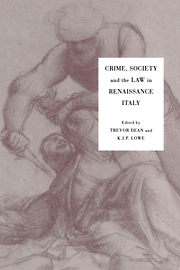Book contents
- Frontmatter
- Contents
- Illustrations
- List of contributors
- Preface
- 1 Writing the history of crime in the Italian Renaissance
- 2 Criminal justice in mid-fifteenth-century Bologna
- 3 The judicial system in Florence in the fourteenth and fifteenth centuries
- 4 The incidence of crime in Sicily in the mid fifteenth century: the evidence from composition records
- 5 Theology, nature and the law: sexual sin and sexual crime in Italy from the fourteenth to the seventeenth century
- 6 Practical problems in the enforcement of Italian sumptuary law, 1200–1500
- 7 The prince, the judges and the law: Cosimo I and sexual violence, 1558
- 8 Intervention by church and state in marriage disputes in sixteenth- and seventeenth-century Florence
- 9 The writer and the man. Real crimes and mitigating circumstances: il caso Cellini
- 10 The political crime of conspiracy in fifteenth- and sixteenth-century Rome
- 11 Fighting or flyting? Verbal duelling in mid-sixteenth-century Italy
- 12 Banditry and lawlessness on the Venetian Terraferma in the later Cinquecento
- 13 Mihi vindictam: aristocratic clans and rural communities in a feud in Friuli in the late fifteenth and early sixteenth centuries
- Index
3 - The judicial system in Florence in the fourteenth and fifteenth centuries
Published online by Cambridge University Press: 14 October 2009
- Frontmatter
- Contents
- Illustrations
- List of contributors
- Preface
- 1 Writing the history of crime in the Italian Renaissance
- 2 Criminal justice in mid-fifteenth-century Bologna
- 3 The judicial system in Florence in the fourteenth and fifteenth centuries
- 4 The incidence of crime in Sicily in the mid fifteenth century: the evidence from composition records
- 5 Theology, nature and the law: sexual sin and sexual crime in Italy from the fourteenth to the seventeenth century
- 6 Practical problems in the enforcement of Italian sumptuary law, 1200–1500
- 7 The prince, the judges and the law: Cosimo I and sexual violence, 1558
- 8 Intervention by church and state in marriage disputes in sixteenth- and seventeenth-century Florence
- 9 The writer and the man. Real crimes and mitigating circumstances: il caso Cellini
- 10 The political crime of conspiracy in fifteenth- and sixteenth-century Rome
- 11 Fighting or flyting? Verbal duelling in mid-sixteenth-century Italy
- 12 Banditry and lawlessness on the Venetian Terraferma in the later Cinquecento
- 13 Mihi vindictam: aristocratic clans and rural communities in a feud in Friuli in the late fifteenth and early sixteenth centuries
- Index
Summary
Late medieval Florence offers special opportunities for the study of justice and criminality: the largest judicial archive of the age, a lively historiographical tradition, a rich social history and complex political organization. These advantages have favoured a flowering of studies – concentrating on institutional aspects and on criminal justice – that now allow a credible general picture to be drawn of the development of criminality and of changes in judicial organization from the mid fourteenth century to the end of the fifteenth. Many aspects and problems, however, remain unexplored, as the methodology and concepts in use, in studies of Florence as of other cities, have been slow to progress. The historiography of Renaissance Italy, still set in its Burckhardtian mould, has shown an unwillingness to open up to other areas of research, and this contrasts with the wealth of the available documentation. In addition to aspects as yet unexplored, there is a failure to take account of research and interpretative models arising from other times and places: for example, the problems regarding the transition from community-based forms of law and social control to state forms; or the interaction between different judicial systems, that is, between public justice and other infra-judicial forms of settling disputes; or analysis of the emergence of a public penal system; or the role of jurists and legal experts in the production of law and in judicial activity.
- Type
- Chapter
- Information
- Crime, Society and the Law in Renaissance Italy , pp. 40 - 58Publisher: Cambridge University PressPrint publication year: 1994
- 8
- Cited by



